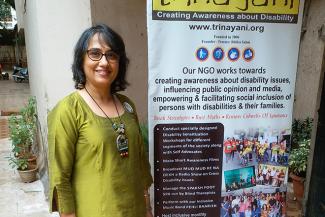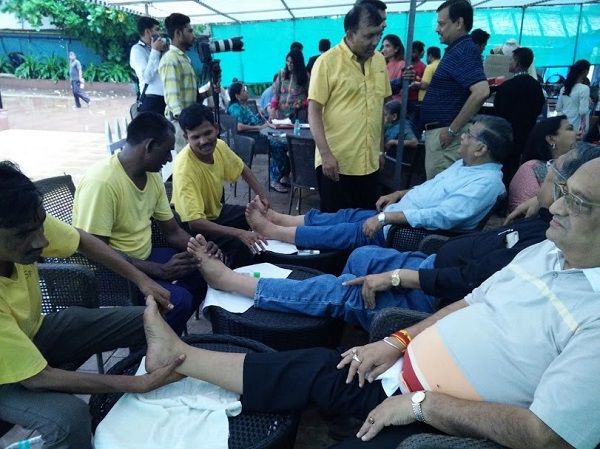
Ritika Sahni, a singer-activist, special educator and Founder of NGO Trinayani, an advocacy driven organization, emphasises that it is important to change attitudes and mindset of the non-disabled population if we want to make the world more inclusive for persons with disabilities.
Could you tell us a little about Trinayani and how was it conceptualized?
Trinayani is an NGO founded in 2006. It has been working towards creating awareness about disability and diversity issues and empowering disabled people by engaging them in meaningful initiatives. Our core objective is to make difference in the lives of disabled people while simultaneously enabling non-disabled people to be aware and accepting of them. To us Disability Awareness is very important to break stereotypes and overcome preconceptions regarding disabilities.
Trinayani was conceptualised due to my years of experience and evolving perspective. I have done a Bachelor’s Degree in Deaf Education from Ali Yavar Jung National Institute of Speech & Hearing Disabilities in the 90s and taught at various institutions dealing with disability as a Special Educator, Communication therapists and Inclusive support teacher. My extensive work experience with the disabled community was a great learning. As a Consultant in Disability Inclusion, I realised that it was equally important to empower the 90 per cent of the non-disabled population of the country who were making all the decisions which affected the lives of the disabled people. Thus in 2006 I decided to start Trinayani with the objective to primarily change perceptions, attitudes and mindsets of the non-disabled population.
What is the mission of Trinayani?
To include, honor and empower persons with disabilities (PWDs). To live in a world where the PWDs are understood and respectfully included to live a meaningful life, on justified terms. We are an advocacy driven organization and we work towards changing mindsets and creating awareness about disabilities.
What are the main activities of Trinayani?
While our chief motive remains awareness – and there are many battles against attitudinal barriers pending to be waged, we have evolved into a multi-pronged outfit. Over the years, Trinayani’s activities have expanded across various domains. Some of these include:
- Conducting awareness, sensitization and capacity building workshops for primary, secondary and higher education institutions through card games, outdoor activities, literature and films, designed by us for this purpose.
- Conducting sensitization sessions for public and private sector employees focussing on the language and etiquette of disability, understanding diversity and access issues faced by disabled people.
- Creating short films and music videos aimed at awareness, particularly highlighting the strengths and needs of disabled people. These are available on YouTube.
- Organizing inclusive monthly meets-ups to enable people with disabilities to access and use the public domain. The motive is to facilitate visibility of people with disabilities, while offering them experiences that are fun and mutually rewarding for them.
How does your organization create awareness about disability?
We specialize in demystifying the subject of disability through “Disability Awareness and Sensitization Workshops” designed in accordance with the “Need Base and Relevance” of different groups of professionals hailing from various industries and public service sectors and for the Academic community. Among others, we have done workshops for the Airline industry, Loreal beauty company, bus conductors in Panjim, nurses at Tata Memorial Hospital, Rotary Clubs, Municipal Corporation Schools, and the like. I have designed and conducted an exhaustive one-year awareness campaign in 4 Delhi Public Schools run by Takshila Educational Society.
What has been the most satisfying initiative of Trinayani?
Four years back, one of our poems ‘I am special and so are you’ written by Vanessa Ohri was included in the Class X English language curriculum of CBSE. For 3 years it was part of the curriculum. This is our contribution towards generating respect and tolerance for diversities amongst the academic community. It was a big moment for us.
The other most satisfying initiative was our year-long disability awareness campaign in 4 Delhi public schools. This was the first programme of its kind in the country.
Does Trinayani also provide employment to disabled people?
We don’t work on employability per se. My focus is advocacy. When people approach us for jobs, I connect them to NGOs and organisations who only work on employability. However, to “Walk the Talk”, as an extension of Our Mission, Trinayani started THE SPARSH FOOT SPA in 2011 to provide dignified livelihood to persons with visual impairment, who manage it independently. Besides running the spa, they are also available on call for regular visits at Offices, Gyms, Restaurants, Cultural Events, Marathons, Social Parties and Regular Salons & Malls and regularly reach out to the wider non-disabled community. All this provides us a unique opportunity for self-employment and helps in altering perceptions and attitudes of the community towards blind persons.

Image description: Persons with visual impairment in yellow t-shirts giving a a foot massage to customers
What does disability etiquette entail?
With the intent to create a welcoming, empowering and relaxed environment for everyone, here are some basic ground rules regarding etiquette we should all keep in mind while interacting with persons with disabilities.
When meeting people who have a hearing impairment:
- Do not begin a conversation with a hearing – impaired person until he/she has noticed you and is prepared for it.
- Talk directly to the person, even when a sign language interpreter is present.
- When you are speaking to a hearing impaired person, do not shout or exaggerate your lip movements.
- Rephrase, rather than repeat, sentences that the person doesn’t understand.
When you meet a person on a wheelchair:
- Don’t assume the person has an intellectual disability.
- Speak directly to the person, not to an attendant who may be with him or her.
- Do not push, lean on, or hold onto a person’s wheelchair unless the person asks you to. The wheelchair is part of his or her personal space. Always ask whether assistance is required or not.
- Try to put yourself at eye level when talking with someone in a wheelchair so that he or she will not get a stiff neck from looking up for a prolonged period. Sit or kneel in front of the person.
When you are with a person who has a speech and language disorder:
- Don’t assume the person has an intellectual disability.
- Pay attention, be patient, and wait for the person to complete a word or thought. Do not finish it for the person.
- Don’t pretend you’ve understood if you haven’t. Ask the person to repeat what is said
- Be prepared for various devices or techniques used to enhance or augment speech. Don’t be afraid to communicate with someone who uses an alphabet board or a computer with synthesized speech.
When you are with a person who has an intellectual disability:
- Speak in a normal tone of voice.
- Use simple words and short sentences.
- Talk with the person even though he or she may not be verbal enough to respond. Introduce yourself and say that you are pleased to meet the person. Shake hands if that seems appropriate.
- Give one piece of information at a time, and repeat if needed.
Do you have any message for the non-disabled community?
India’s challenges for persons with disabilities are not only a handful, nor can they be solved by a single shot. It will take careful sensitization, focused litigation and moreover, a change in the mass mindset for a difference to be felt. I think we need to learn to accept differences, be positive, accepting, understanding and non-judgmental. We need to improve our attitude and help make our society tolerant and barrier free, to respect the abilities of our friends who do things differently and have different disabilities.
We believe “Disability is not the problem. The real problem is ATTITUDINAL Barriers.”






